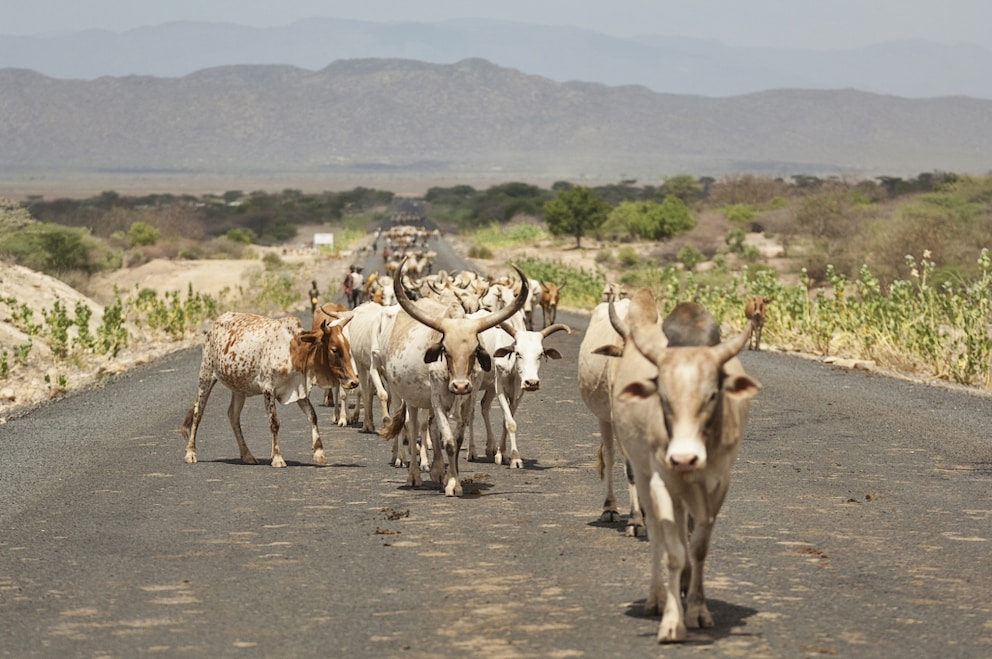September 2, 2024, 3:47 pm | Read time: 10 minutes
Wild, untouched nature, fascinating cultures, vast land and thousands of years of history—a trip to Ethiopia is an adventurous vacation in the best sense of the word. This is exactly why there are so many things to consider prior to visiting and staying in this location, as a stay there is the exact opposite of a standard package vacation. Our author has been on the road for you and reveals everything you need to know for an all-around successful experience.
How do you envision a country that defies imagination? Unimaginable, in the sense that it doesn’t even remotely resemble anything that even an experienced traveler has ever seen before? A country that inundates you with a kaleidoscope of extraordinary, delightful, and occasionally bizarre impressions that are at times completely overwhelming? In the case of Ethiopia, the answer is simple: just forget everything you think you know from stories or the media and just go there yourself. Because Ethiopia really is a country that you have to see with your own eyes to understand. And even then, it will still be difficult.
Overview
I recently had the privilege of traveling to Ethiopia. A country whose north is only just recovering from years of bloody civil war. And where around 120 million people live in an area the size of France and Spain combined. Where the average worker earns less than one euro a day. Even so, the people laugh with a warm heart, as if they were the richest people in the world. Where countless ethnic groups with thousands of years of history live randomly scattered across an unimaginably vast land mass. A place that speaks a total of around 80 different languages. It is a country that, at first glance, seems foreign and yet inviting at the same time. It probably completely overwhelms anyone who is there for the first time, in the best way possible.
Immense distances
The distances and travel times alone that you have to cover there to reach a destination are sometimes absolutely unimaginable. This is because there are currently only 78 kilometers (48 miles) of freeway in the entire country. And also because of the sometimes pitiful condition of the sparsely populated “roads” that crisscross the country like an archaic network of veins. I covered around 2,800 kilometers (1,740 miles) in 12 days, and yet I was never more than a day’s journey away from the capital, Addis Ababa. This is where people arriving from Germany will normally arrive. The bustling metropolis, home to over three million people, serves as the starting point for all journeys within the country.
The capital of Ethiopia can be reached directly via Frankfurt am Main with Ethiopian Airlines. Turkish Airlines also flies to the destination from several German airports via Istanbul. Bole International Airport is located just a short distance from the city center. This is where the adventure begins and where you will usually meet your local guide. You will definitely need one if you want to make the most of your time in this African country. This is due to the fact that foreigners are not permitted to rent a car in Ethiopia without a guide. You should therefore organize this in advance with an agency of your choice.
Swap cleverly
I was traveling locally with a host in a group of 12 people. It was mainly thanks to our three drivers that the trip was unforgettable, magnificent in all senses, and often a completely overwhelming adventure. Because it is, of course, the locals who always know exactly where the exciting things are happening and which destinations are generally worth seeing. The security of having someone with you who can communicate with the locals is another huge plus. Just over the border from Addis Ababa, you can completely forget your English and the few bits of the official language, Amharic, that you may have learned.
Last but not least, it will probably be your guide who gives you access to the country and its breathtaking markets in the form of local currency. In Ethiopia, you pay with the Birr, and the official exchange rate to the Euro is around 1 to 120. However, you can be almost certain to get a much better exchange for your money with a guide. This is because foreign currencies such as Euros and Dollars are in high demand. In general, the clear recommendation is to take sufficient cash with you, as it is not uncommon for ATMs not to work or to run out of reserves, even in the capital. Especially in the countryside and in the south, experience has shown that a search for cash can sometimes take days.
Uninvited room guests
A note on money: try to have your exchange amount paid out in as small a sum as possible. The most popular means of payment is the 10 Birr bill, because it is the most convenient way to pay. Prices are often ridiculously low by German standards. Sometimes these bills are worn down to the transparency of bible paper and glued several times because they change hands so often. Hundreds and two hundreds, on the other hand, often look as good as new when you receive them. They are suitable for paying at restaurants or hotels. Especially those that have at least a rudimentary standard comparable to Europe. In general, however, the rule of thumb is that four stars in Ethiopia would normally be two to three stars at most in Germany.
You’ll need to adjust to this reality, as accommodations are generally quite basic, particularly in rural areas. Flexibility is required here, as sometimes neither the internet works nor is there hot water for showers. In hotels that have visibly not had any guests for a long time, there may also be uninvited guests such as insects, lizards or even frogs in your room (mine was in the shower). However, the friendliness of the locals and the absolutely courteous service should hopefully make you forget these little inconveniences very quickly.
Good food, bad roads

A word about the food: Ethiopian cuisine may not be the most varied, but it is certainly very tasty. Typically, you will be served an “enjera” flatbread made from millet flour with your meal anywhere in the country. You can also order “shiro” or “tegabino”, two more or less thick sauces made from chickpeas and/or beans. If you prefer meat instead, order “tibs”, which is usually sheep or goat. The locals have a penchant for spicy cuisine, and should you wish to emulate their palate, request “berbere”. This is either chili powder or a fiery salsa. However, especially in the cities and tourist resorts, you don’t have to do without dishes such as pizza, pasta and hamburgers.
I already mentioned the condition of the “roads” at the beginning. Nevertheless, you will have to accept that you will sometimes feel like you are sitting in the car for days on end when traveling through Ethiopia. Due to the conditions, it is not uncommon to need around ten hours to cover a distance of 300 kilometers (186 miles), including breaks. Especially as you can completely write off driving faster than 30 kilometers (18.6 miles) per hour, especially in urban areas. This is due to the fact that life in Ethiopia takes place in many places, including the roads. In a country where there is hardly any traffic worth mentioning, it is nevertheless regulated in sometimes highly bizarre ways.
Encounters with the locals

Donkeys, sheep, goats, cats, and dogs frolic on the roadsides, and it’s a common sight to witness an entire herd of cattle, sometimes numbering in the hundreds, being herded past honking vehicles with serene indifference. Camels can appear in front of you in the south of Ethiopia, as can dwarf antelopes and, of course, people, young and old. Sometimes they even set up unofficial “traffic checkpoints” and charge you a small fee to continue your journey. In a country where every farmer now carries a Kalashnikov to protect their livestock, foreigners should respectfully remain silent at such times and leave the negotiations to their guides.
The greatest adventure of all, however, is getting to know the locals, especially the ethnic groups that are so numerous in the south. Perhaps more than in any other country, they are currently experiencing a radical cultural change as a result of tourism. A good start is to put your right hand on your heart when you meet someone and indicate a bow, ideally accompanied by a ubiquitous greeting such as “Salām”. During my stay, I also really enjoyed learning at least the words for “Hello”, “How are you?” and “What’s your name?” from every ethnic group we visited. With the help of gestures, a little conversation was already underway, and I felt a little less self-conscious.
A nerve-wracking stay

It must be said candidly: encountering certain ethnic groups in the south of Ethiopia can be a profound culture shock. The people there live according to their traditions, sometimes in the simplest of huts, just as they did hundreds, perhaps thousands of years ago. The women are sometimes bare-breasted, the children completely naked and there is no electricity and no running water. You really have to be careful here that a visit doesn’t simply degenerate into a photo safari. Because of course you want to capture that which is foreign and fascinating. And of course the locals expect a fee for this, which is usually fixed in advance per person and amounts to the equivalent of perhaps three euros.
As a true traveler who wants to stand out from the mere tourist, you should try to see things through more than just the lens of your camera. Especially as the visits to the various ethnic groups are sometimes very short. This is also due to the fact that they can be quite nerve-wracking for guests. You have to be mentally prepared to be constantly and sometimes very annoyingly approached for money or receiving other attention from the second you arrive. The worst thing for me was feeling guilty about not being able to give something to everyone in need, even though I had so much more than they did.

‘Why the South of Ethiopia Fascinated Me So Much’

5 Types of Work That Make Long-Term Travel Possible

Why Ubud Was the Berlin of Bali for Me
Avoid the rainy season

There are also a few things to consider before the actual trip to Ethiopia. For example, from February to March and then from June to September, there is a short and a long rainy season. During this period, it can sometimes rain so heavily that even rudimentary roads become completely impassable. When I visited the country in July 2024, there were also several landslides, resulting in hundreds of deaths due to the rainfall. And finally, as a German, you need a visa to enter the country, which you can easily apply for in advance on an official Ethiopian government website. At a cost of 82 dollars, it is quite expensive, in my opinion.
In conclusion, one thing remains to be said. Embarking on a journey to Ethiopia requires both courage and confidence. Where curiosity begins and cosmopolitanism is already present, you can experience the adventure of a lifetime. I have already been to around 70 countries. But none of them can even begin to compare with Ethiopia in terms of exoticism and uniqueness. All the countless deep impressions that the country left on me are now tattooed on my heart as a reminder. And once again, I humbly say thank you for an absolutely unforgettable experience.

